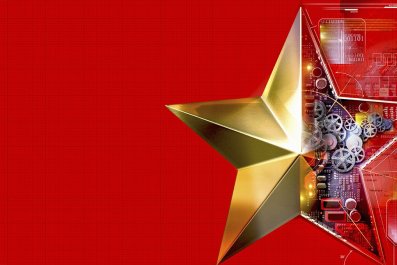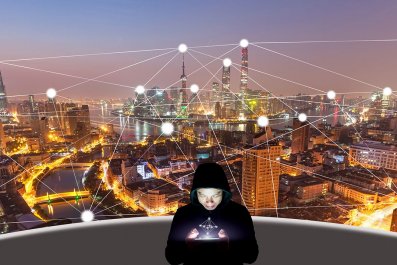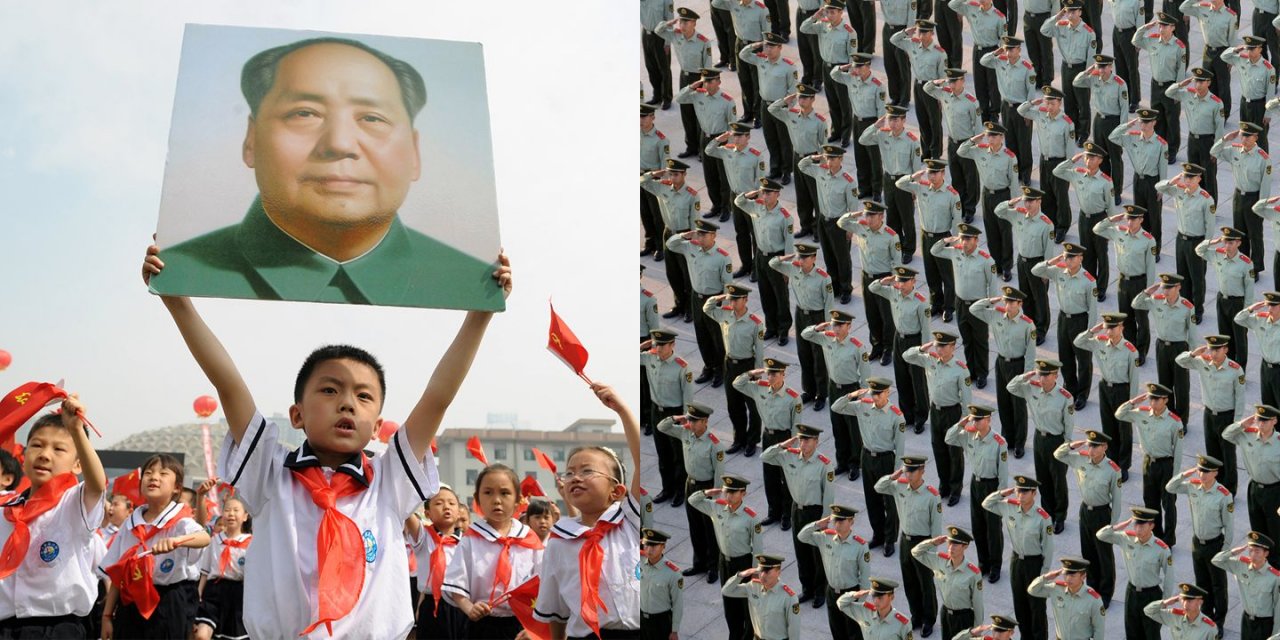
I t has become more and more obvious that our strategies for dealing with China don't work.
For years, we have watched America's manufacturing sector slowly migrate east. And right now we are watching China (through the giant telecom company Huawei) attempt to dominate the worldwide deployment of 5G technology. Very soon, we could be operating in a world in which the internet as we know it is maintained and controlled by a totalitarian Communist country.
Our strategies are failing because they are based not on reality but on two key myths. Decades ago, we—and I include myself—sold ourselves a fantasy version of China. The real thing is far more formidable and dangerous than we wanted to believe. I will explore this new reality in a book I'm writing called Trump Versus China: America's Greatest Challenge.
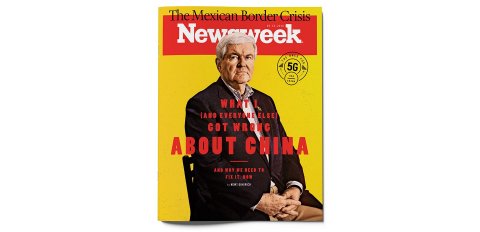
Part of our misreading was based on our own arrogance and wishful thinking and part on a deliberate Chinese strategy of deception, a policy of showing us a face that looked pleasant, reasonable and nonthreatening.
In 1979, for instance, a smiling Deng Xiaoping was photographed wearing a cowboy hat at a rodeo in Texas. The picture softened Deng's image in the West and helped offset warnings by dozens of scholars and intelligence analysts about his real intentions. It helped obscure the fact that Deng had helped found the Chinese Communist Party in 1921, spent a year studying Leninism in Moscow, and devoted a lifetime to the Communist dictatorship.
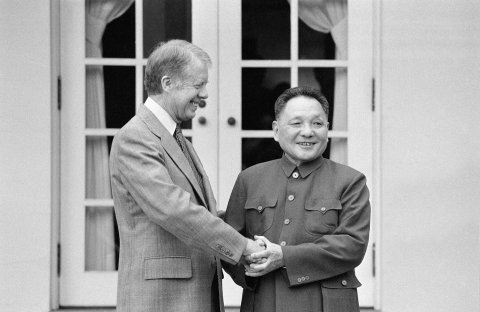
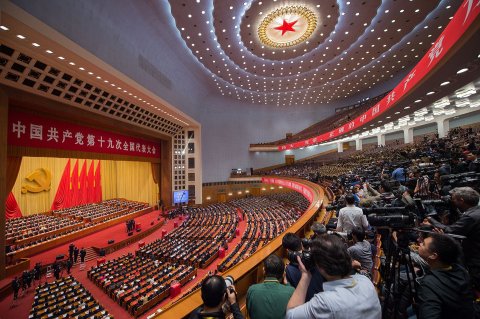
As for American hubris, it grew out of our wealth and military power, as well as the decisiveness of the collapse of the Soviet Union. In the early 1990s, when some American scholars and politicians proclaimed a new world order, it seemed obvious that the immature and economically underdeveloped Chinese would inevitably have to learn to fit into the liberal values and rule of law we thought were beginning to dominate the world. Deng's historic 1992 speeches calling for China to favor open markets and economic results over ideology came during the peak of this "end of history" delusion.
All that helped us believe that having tens of thousands of Chinese students come to American colleges and universities would infect them with a passion for liberty. It also helped us convince ourselves that admitting China to rules-based systems like the World Trade Organization would make it more law-abiding and that as China developed its own intellectual property it would begin protecting—rather than stealing—ideas. I believed these things too. I supported China's entry into the WTO when I was serving in Congress, although it didn't officially join until after I left.
Meanwhile, our own so-called experts painted a distorted picture of Chinese history and culture in which China was a relatively peaceful country that had historically posed no threat to its neighbors. Even today, there is a bloc of scholars who argue that China is—at most—a regional power without big global ambitions or capabilities.
Myth 1: China Wants to Change
There is one very simple and fundamental fact that no one in Western governments or news media wants to deal with.
The remarkably smart, tough and driven leader of China, Xi Jinping, is general secretary of the Chinese Communist Party, chairman of the Military Commission and president of the People's Republic of China—in that order. When we refer to him, as we always do, as President Xi, we are distorting reality.
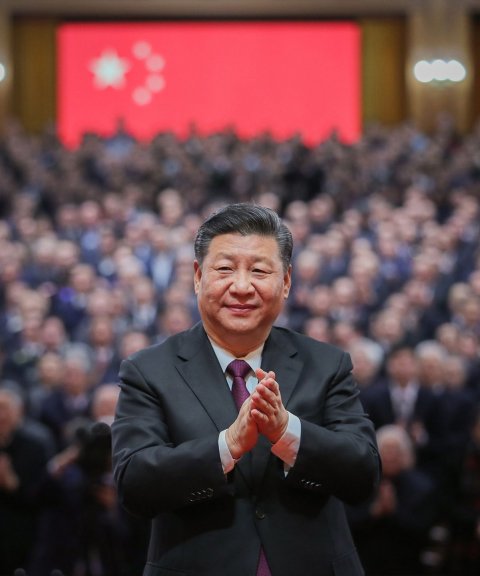
Xi's primary power base is the Chinese Communist Party. Since the military is an instrument of the party, and the party defines all policy, the role of general secretary is far more powerful than the role of president. Very few Americans understand the central role or the power of the party.
The Chinese Communist Party today has close to 90 million members, more than Germany has citizens. It is larger than the combined populations of California, Florida and Texas. It has members virtually everywhere in China. Every major company that operates in the country is required to establish party cells. Every community has party members involved in decision-making. The general secretary sits at the top of this system and is therefore enormously powerful.
The Chinese Communist Party is radically different from any American concept of a political party. Since its founding in 1921, it has been a Leninist party, and since the collapse of the Soviet Union, Americans have forgotten what Leninism is and why it is so dangerous.
Lenin was one of the most dedicated and hardened revolutionaries in history. He took the intellectual doctrine of Marxism and turned it into a blueprint for a totalitarian police state, in which the party was dominated by one supreme leader and in which terror and torture were daily instruments of policy. Stalin perfected Lenin's system (and the Nazis and others borrowed many of his ideas), but the founding mastermind was Lenin.
When the early Chinese Communists were looking for a model in the 1920s, they studied Lenin. Later, they would be deeply influenced by Stalin's History of the Communist Party of the Soviet Union (Bolsheviks): Short Course, which, despite being virtually unreadable, was the most widely circulated book in the Soviet Union in the 1930s. Leninism is still at the core of the Chinese system.
Second, Xi's predecessors, Deng and Jiang Zemin, both used the chairmanship of the Military Commission as the base of their power. The People's Liberation Army plays a much greater role in China than most Westerners understand. In fact, it was partly the military that ended the Cultural Revolution and stopped the turmoil and bloodletting Mao Zedong had unleashed from 1966 to 1976.
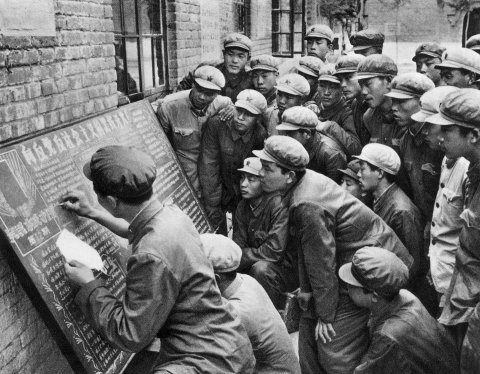
Americans must remember that every time they negotiate with China, they are negotiating with a Leninist state that is under centralized control, has a ruthless willingness to lie to outsiders and is constantly purging itself of dissenters. Every senior Chinese leader who has advocated opening up the system in any significant way has found himself isolated. Several have ended up under house arrest for life. It was this focus on centralized control in the Leninist model that made the violent suppression of the 1989 demonstrations in Tiananmen Square almost inevitable.
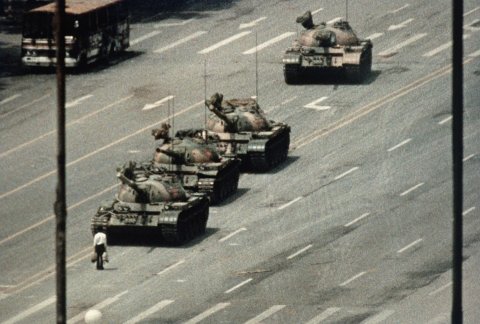
It was only when I realized how deeply and sincerely Deng was a Leninist that I realized how naïve—indeed silly—it was to think that his calling for a market economy was a step toward a free society. Deng, I came to realize, was saying that a market economy was necessary to preserve the monopoly of the Communist Party—not change or end it.
Myth 2: China Is Inherently Peaceful
In addition to our misunderstanding of the key influence of Lenin on China's leaders, many of us in the West also labor under the delusion that, before it became communist, China was an inherently passive, peaceful or inward-looking country. The number of so-called experts who continue to use this delusion to argue that we don't have to worry about China is amazing. The idea has no basis in either recent or ancient Chinese history.
Historically, the nation of China emerged out of a 250-year period of "the warring states." This time of constant warfare ended when Ying Zhen of the Qin Dynasty unified China by conquering the last free states in 221 B.C. Ying created a new title for himself, which is translated as emperor, in effect becoming the sole leader of what came to be known as China (after the Chin, or Qin, Dynasty, which unified it).
We can tell something about what kind of emperor he was by the preparations he made for the afterlife. Ying built a necropolis for himself estimated to cover 38 square miles, surrounded by a moat of poisonous mercury and guarded by 8,000 life-size terra-cotta warriors.
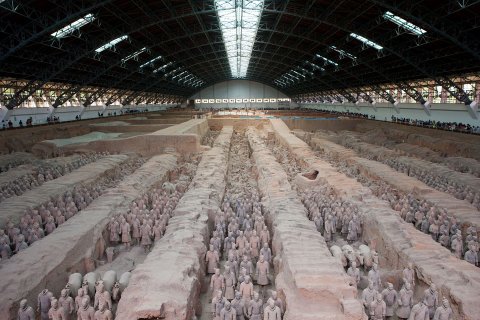
The long era of warfare led to a great deal of thinking and writing about how to win wars and avoid losing them. The most famous book to come out of that is Sun Tzu's The Art of War, written about 500 B.C. This is a classic account of how to use bribery, espionage and psychological warfare to undermine your enemy. "To subdue the enemy without fighting is the acme of skill," Sun Tzu wrote.
Even after unification, Chinese history is filled with conflict. The last imperial dynasty, the Great Qing, created by the Manchu with conquests beginning in 1636, was among the most aggressive. It dramatically expanded China to the west. Many of these areas, in which local people are currently rebelling or very unhappy (for example, Tibet or the Uighurs), were added by the Qing during their first 200 years in power. The Qing dynasty was expansionist and shifted focus to defense against foreigners only after the first Opium War in 1842.
The period from 1842 to the announcement of the People's Republic of China by Mao in 1949 was 107 years of virtually constant strife, rebellion and civil war. And after the Communists took power, their policies—like the Great Leap Forward (millions starved to death) and the Cultural Revolution (millions were sent to the countryside for re-education)—created new kinds of turmoil and suffering. Hardly the placid image scholars and observers of China all too often present.
First Steps Toward a Realistic China Policy
Before we can fix our approach to China we must change our view of China. We must accept that the Chinese have a deep commitment to being Chinese—not Western—and to keeping their society a Leninist one. They have no interest in American-style openness or in political evolution away from their current system.
We must also recognize that with 1.4 billion people, China will inevitably be a major global competitor. Anyone who thinks China can remain a regional power is blind to what is already happening. The Chinese need for minerals, energy, food and other commodities requires a global trading and investment system. The Belt and Road Initiative, which involves Chinese infrastructure investments around the world, will inevitably lead to extensions of Chinese power across the planet.
Recent history supports fears of Chinese assertiveness. China, for instance, has long laid claim to most of the South China Sea. In pursuit of this, it has begun building artificial islands. In the absence of a major confrontation, there is a real likelihood that China will use this tactic to dramatically expand its size. This perfectly fits the Sun Tzu model of success without fighting.
Similarly, China is also poised to defeat the West if America does not prevent it from controlling 5G technology. That would be the largest economic and strategic defeat we've suffered in generations. If our leaders don't rise to the occasion, we could quickly find ourselves in a Chinese-dominant world. Then, the differences in our two civilizations would become painfully clear.





